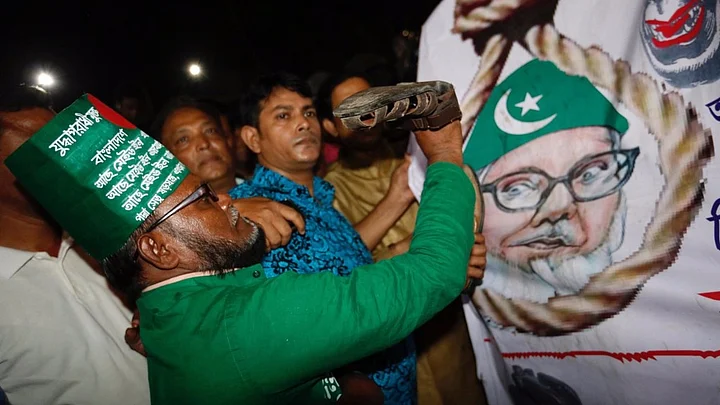Bangladesh's apex court on Monday upheld the life sentence given to a war criminal for committing crimes against humanity during the 1971 Liberation War by siding with Pakistani troops. The Supreme Court dismissed both the pleas filed by the state and the defence and stood by its earlier judgement to jail fundamentalist Jamaat-e-Islami leader Delwar Hossain Sayeedi, 77, until death.
A five-member bench led by Chief Justice Surendra Kumar Sinha delivered the verdict after a two-day hearing.
He (Sayedee) is sentenced to imprisonment for life, rest of his natural life.Justice Sinha to PTI
Both the state and the defence had filed petitions seeking a review of the Supreme Court's verdict in 2014. The state wanted a death sentence while the defence pushed for an acquittal. It was the first case of a war crimes trial, in which the state sought review to maintain the tribunal's verdict.
The trial of Sayedee began at the International Crimes Tribunal-1 in 2011 and a verdict was pronounced in 2013. Of the 20 charges against him, Sayedee was given the death sentence for two – the murders of Ibrahim Kutti and Bisabali, and for setting fire to Hindu households in Pirojpur in 1971, bdnews24.com reported.
Described by followers as a "firebrand Islamic preacher", Sayedee's death penalty in February 2013 triggered violence in parts of the country regarded as Jamaat strongholds, leaving scores dead.
The situation at that time had prompted authorities to call out paramilitary troops to quell his supporters, who were swelled by rumours that Sayedee's image was seen in the moon, in a sign of his innocence.
The Supreme Court verdict, delivered in 2014, sentenced Sayedee on five charges of the 20 that were framed against him.
The verdict reduced Sayedee's death sentence for Ibrahim Kutti's murder to imprisonment for 12 years.
In its second appeal verdict in a war crimes case, the apex court sentenced Sayedee to prison until death for three charges, which include the murder of Bisabali and arson in a Hindu neighbourhood, abduction and rape of three sisters of Gauranga Saha, the report said.
Saha was a prosecution witness and identified Sayedee as the man who had handed over his sisters to the Pakistani army to be taken away as sex slaves. They were returned after three days. Sayedee was also sentenced to prison until death on charges of forcible conversions of 100-150 Hindus, it said.
Six other charges were also proven beyond doubt, but no sentencing followed as he had already been given the death penalty. Fifteen months after the verdict, the Supreme Court published the full verdict in December 2015, paving the way for reviews.
Sayedee is the leader of Jamaat-e-Islami, an Islamist party that sided with the Pakistan Army during the 1971 Liberation War and committed war crimes. He was arrested from his house in Dhaka in June 2010 in a case filed for hurting religious sentiments.
Bangladesh launched the belated process of trying 1971 war criminals in 2010 with the accused mostly being leaders of fundamentalist Jamaat-e-Islami, which was opposed to Independence.
The country has executed six 1971 war crimes convicts, five of them being Jamaat leaders and one from the Bangladesh Nationalist Party, the main opposition party led by former prime minister Khaleda Zia.
(At The Quint, we question everything. Play an active role in shaping our journalism by becoming a member today.)
